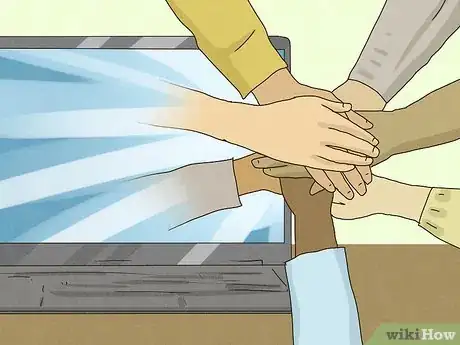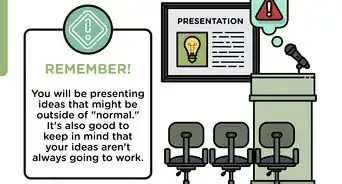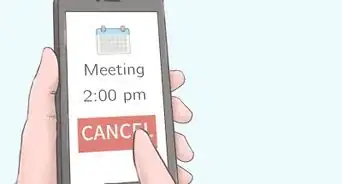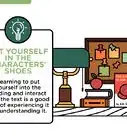This article was co-authored by Julia Lyubchenko, MS, MA and by wikiHow staff writer, Hunter Rising. Julia Lyubchenko is an Adult Counselor and a Hypnotherapist based in Los Angeles, California. Running a practice called Therapy Under Hypnosis, Julia has over eight years of counseling and therapy experience, specializing in resolving emotional and behavioral problems. She has a Certificate in Clinical Hypnosis from the Bosurgi Method School and is certified in Psychodynamic Psychotherapy and Hypnotherapy. She earned an MA in Counseling Psychology and Marriage and Family Therapy from Alliant International University and an MSc in Developmental and Child Psychology from Moscow State University.
There are 18 references cited in this article, which can be found at the bottom of the page.
This article has been viewed 22,332 times.
Do you ever feel like some things are just working against you in life and there’s not much to do about it? Even though it may seem tough to manage, working on building an internal locus of control can help improve your mindset. Your locus of control is your belief of how much influence you have over the events in your life. We know that you probably have a few questions, so keep reading to find out more about how you can start taking charge of your life!
Steps
What does it mean to have an internal locus of control?
-
1You believe what happens in your life is due to the choices you make. If you have an internal locus of control, you put fate into your own hands. You don't believe that other people or outside forces can make you succeed or fail, since you take the actions to get there on your own. You believe that the choices you make directly affect the outcomes, and luck has nothing to do with it.[1]
- For example, if you pass a really hard test, you know you did well from paying attention in class and studying hard.
- As another example, if you get a new job that you love, you believe it’s due to the hard work you spent searching for the position and preparing for the interview.
-
2You have a growth mindset instead of a fixed one. You have a growth mindset if you’re always looking to improve on your talents by working hard, making a plan, and getting input from others. A person with a fixed mindset believes that they have natural talents that they just happen to have. Since you’re consistently choosing to make good decisions to improve with a growth mindset, you’re driven by the things you can control.[2]
- For example, a writer with a growth mindset is continually reading, writing, and getting feedback about their work from other people to find ways to improve. A writer with a fixed mindset thinks they’re talented without any practice.
What behaviors can I work on to develop my internal locus of control?
-
1Take responsibility for your actions instead of blaming others. Whenever something bad happens, it’s easy to say you couldn’t do anything to prevent it. Instead, think about the choices you made.[3] Stop and consider how you’re contributing to the problem and see if there’s anything you can change to make the situation better. If you’re in the wrong, apologize for what you’ve done so you don’t shift the blame onto another person.[4]
- For example, if you get into a fender bender, don't blame the other person for the accident or tell yourself that you're just unlucky. Instead, admit that you may have been distracted and not paying enough attention while you were driving. Apologize to the other driver and accept the blame for the accident.
- Get to know yourself—understand what kind of person you are, what you believe, what you want out of life, and what your strengths are. When you know who you are, it's easier to rely on yourself.[5]
- Try to avoid self-victimizing and self-pity since both tend to shift blame onto other people.[6]
-
2Focus on solutions when you encounter problems. When something bad happens to you, don’t let it be all you think about. Focus on the things you’ve learned from the experience instead of looking at the negatives. Rather than losing hope or doing nothing, see if there’s anything you can do to improve the situation. Brainstorm a list of possible solutions and choose the one that’s most effective.[7] From there, come up with an actionable and realistic plan you can follow step-by-step.[8]
- For example, if you have to finish a work project that someone else started, check what’s already done and make a list of any improvements you could add. Then, write a list of the things you still need to finish and how you could complete them.
How can I make better choices to improve my internal locus of control?
-
1Set actionable goals to base your decisions on. Identify what you really want to do with your life and why it’s important to you. Choose the goals that you feel the most passionate about and make you feel fulfilled. Break down your goals into smaller measurable steps you need to complete. Set a timeframe for you to reach your goal, and make sure it’s possible to reach.[9] Then, put your efforts and energy into those decisions so you’re closer to reaching your goals.[10]
- For example, if you want to become a computer programmer in 1 year, start by writing down everything that you already know how to do. Then, do some basic online searches to see what you need to learn or what degrees you need for a job as a programmer. After that, you can start learning from videos or online courses to practice every day.
- Focus on the decisions you can directly control. For example, if you want to be a better chef, try out some new recipes, cook for your friends, and take some cooking classes.
-
2Embrace new opportunities even if they're scary. If you’re scared of failure, you might not take an amazing opportunity that comes up in your life.[11] Actively look for things you want to do and achieve, and get involved with them. Push yourself out of your comfort zone and do things that you normally wouldn’t do. While you’re doing something new, keep an open mind and think of how the experience benefits your goals.[12]
- For example, even if you don’t think you’re a good artist, sharing your work with friends so you can get feedback. You never know who likes what you’re already making.
- As another example, if there’s a leadership position at work you want but you don’t exactly fit the job description, take the opportunity to apply anyway.
How should I handle failures and setbacks?
-
1Reframe failures as learning experiences. Even if you fail at something, turn it from a negative into a positive. If something goes wrong, look back on what you did to get that point so you can see your missteps. Keep a positive mindset and avoid getting bogged down by the negativity of the situation. Determine the best ways you can grow and learn from the situation.[13] The next time you’re in a similar situation, remember what steps led to failure and take actions that help put you in a better decision.[14]
- For example, if you aren’t able to finish a 5k race in the time you wanted, recognize that you haven’t trained enough or that you didn’t get a good night’s sleep beforehand. If you run a race again, start training harder and make sure you get to bed at a reasonable time so you’re well-rested.
- As another example, if you invest a lot of money in a business and it flops, practice being more fiscally responsible and look to improve your management styles.
-
2Move on from negative events instead of dwelling on them. Rather than getting concerned with what other people think of you and negative feelings, accept what’s happened and move on to the next thing. Whenever you feel negative thoughts coming, take a minute to recognize your feelings and reflect on them. You can also try distracting yourself with exercise, talking to a friend, or starting a project.[15]
- For example, if you’re feeling down about not getting a job, try playing your favorite game or going for a long walk to destress. After that, you can look for new jobs to apply to.
What are the benefits of an internal locus of control?
-
1You may have higher self-esteem and more confidence. Since you’re taking control of what you do, you’ll feel a lot more comfortable and confident in your abilities. You’re able to influence what happens in your life, so you’ll feel a lot better no matter if you fail or succeed.[17]
- While it’s good to be confident in your abilities, be careful not to get too arrogant about what you can do on your own.
-
2You may feel more driven to achieve your goals. When you break down the steps of your goals, see what events you can control so you’re motivated to put your best foot forward. Find new solutions to problems you’ve had in the past and feel satisfied as you complete each step and get closer to finishing your goal.[18]
- Know your limits for how much you can control since you might make yourself more stressed or anxious if you set the bar too high for yourself.
Warnings
- If you think that you can control absolutely everything in your life, you’ll feel anxious and stressed out. Make sure you set realistic expectations for yourself instead.[23]⧼thumbs_response⧽
References
- ↑ https://journals.sagepub.com/doi/full/10.1177/2047173415577509
- ↑ https://hbr.org/2016/01/what-having-a-growth-mindset-actually-means
- ↑ https://www.forbes.com/sites/melodywilding/2020/03/02/successful-people-have-a-strong-locus-of-control-do-you/?sh=4d02ac787af3
- ↑ https://www.forbes.com/sites/kathycaprino/2019/08/18/4-ways-to-take-accountability-for-your-actions-and-why-so-many-dont/?sh=33ff34586dab
- ↑ Julia Lyubchenko, MS, MA. Adult Counselor & Certified Hypnotherapist. Expert Interview. 29 April 2020.
- ↑ https://www.psychologytoday.com/us/blog/having-sex-wanting-intimacy/201312/self-victimizing-again
- ↑ https://www.entrepreneur.com/article/249129
- ↑ https://www.forbes.com/sites/glennllopis/2013/11/04/the-4-most-effective-ways-leaders-solve-problems/?sh=50fa6dd04f97
- ↑ https://www.forbes.com/sites/forbescoachescouncil/2020/01/09/how-to-define-your-goals-and-work-toward-them-eight-actionable-steps/?sh=21711fb2202d
- ↑ https://psychcentral.com/blog/cultivating-an-internal-locus-of-control-and-why-its-crucial#3
- ↑ https://psychcentral.com/blog/cultivating-an-internal-locus-of-control-and-why-its-crucial#3
- ↑ https://climb.pcc.edu/blog/how-to-embrace-and-effect-change-in-the-workplace
- ↑ https://www.forbes.com/sites/chrismyers/2018/09/18/how-to-accept-process-and-learn-from-failure/?sh=3b5dac479ff6
- ↑ https://www.forbes.com/sites/melodywilding/2020/03/02/successful-people-have-a-strong-locus-of-control-do-you/?sh=4d02ac787af3
- ↑ https://www.psychologytoday.com/us/blog/what-mentally-strong-people-dont-do/201602/5-ways-stop-reliving-painful-memories
- ↑ https://psychcentral.com/blog/cultivating-an-internal-locus-of-control-and-why-its-crucial#4
- ↑ https://www.psychologytoday.com/us/blog/moments-matter/201708/locus-control
- ↑ https://www.businessinsider.com/proactive-people-are-successful-and-less-stressed-2014-7
- ↑ https://blogs.harvard.edu/sammy/2008/11/20/internal-locus-of-control/
- ↑ https://journals.sagepub.com/doi/full/10.1177/2047173415577509
- ↑ Julia Lyubchenko, MS, MA. Adult Counselor & Certified Hypnotherapist. Expert Interview. 29 April 2020.
- ↑ https://psycnet.apa.org/record/1978-09912-001
- ↑ https://www.businessinsider.com/proactive-people-are-successful-and-less-stressed-2014-7



































































